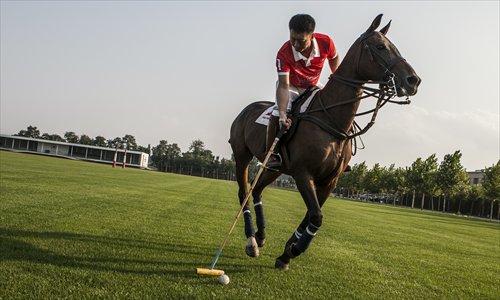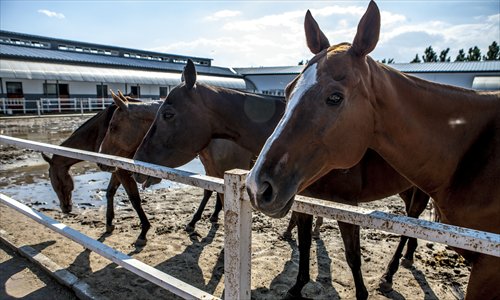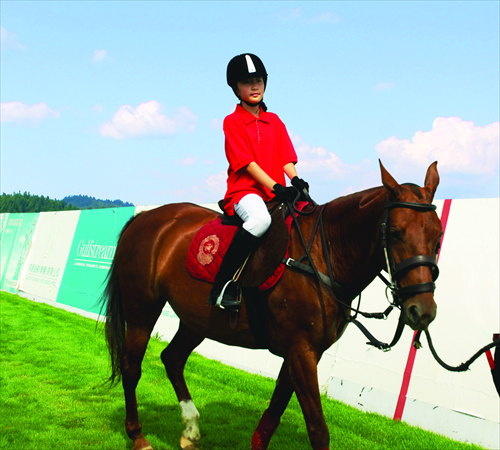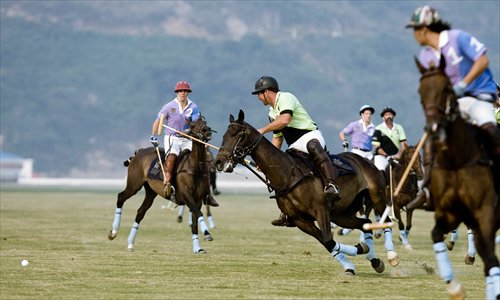The sport of kings
Polo is enjoying a revival among China’s wealthy elites

Liu Shilai, an avid amateur Chinese polo player and the founder of the Tang Polo Club in Tongzhou district. Photo: Li Hao/GT
On a bright afternoon in a vast, primly trimmed lawn hidden behind the gated walls of the Tang Polo Club in Beijing's Tongzhou district, a handful of men, gallantly attired in ankle-high boots and carrying long cane mallets, chase a small plastic ball on horseback. It is the last week of September, and cheered on by family and friends, the men are fighting for the bragging rights of being named the champions of the 2014 China Open Polo Tournament.
"I see polo as a battlefield without smoking guns, waged between social elites from different countries," said Liu Shilai, a member of the winning Royal Salute China Team that vanquished all comers to take the tournament title this year.
Once a popular Tang Dynasty (618-907) pastime that made its way to China from Persia via the silk road, polo has in recent centuries come to be associated with the aristocratic leisure classes in the West. For many, it represents the kind of social privilege that is today ridiculed - a relic of a bygone era when wars were waged on horseback, and a distasteful reminder of an era when wealth and power was controlled by a small number of ruling families while the majority lived in destitution.
During the Cultural Revolution (1966-76), polo ceased to be played in China. However, as the country's fortunes have changed in recent decades, there is again a growing interest in the sport among China's wealthy.
The sport made its official return to these shores with the Royal Salute Polo Championship held at the Zhejiang Nine Dragon Hill Polo Club in 2007. At present, there are four polo clubs in Beijing and Tianjin, each of which host a number of invitational polo events each year.
"In China, most people who play polo are private entrepreneurs aged between 40 and 50," said Liu, who in addition to being an avid polo player, also serves as the chairman of the Jinghong Investment Company and is the founder of the Tang Polo Club where this year's China Open was hosted.
Although it is estimated that there are less than 100 polo players in the country, this is in part by design. The Tang Polo Club's website, which describes itself as "provid[ing] a first-class country club atmosphere to social elites," keeps membership numbers to just 40 people "in order to maintain the club's exclusivity."
It was reported by the Guangzhou Daily that annual membership to a polo club in China can cost at least 380,000 yuan ($61,925) per year.

Horses raised at the Tang Polo Club. Photo: Li Hao/GT

Yuki Liu, a young polo player from the Tianjin Goldin Metropolitan Polo Club. Photo: Courtesy of Tianjin Goldin Metropolitan Polo Club
The sport of kings
Polo has traditionally been known as the "sport of kings."
Unlike most professional sports these days which are financially backed by a corporate funding structure, polo teams are supported through a patron system. The patron uses his personal wealth to pay for the costs of running a team, from the wages of professional players, veterinarians and groundsmen to travel and accommodation expenses. The team's patron, usually an amateur polo player, will often play alongside the professionals as a member of the team.
The term "patron" and the economic structure it describes harkens back to the sports' aristocratic history, in which those who possessed specialized skills in the sciences, music or art were entirely reliant on a wealthy landowner for their livelihoods.
Also reproducing the dynamics of aristocratic privilege is the opportunity afforded by polo patrons to hobnob with social elites around the world.
Liu has played polo with Prince William and Prince Harry; and Xu Peifeng, a Shanghai-based businessman who is one of the four or five other polo patrons in China, has brushed shoulders with Thailand's royal family.
"It has enabled me to join social circles consisting of successful businessmen and members of the nobility," said Xu. "After the tournaments, we can enjoy chatting as friends."
Xu frequently plans his daily agenda around his polo engagements, traveling to Thailand and Europe when it is too cold to play in China. For this year's China Open, Xu especially flew to Beijing on the morning of the competition, before returning to Shanghai in the evening over the weekends.
Wealthy Chinese parents are also keen to see their children take up the sport, in the hopes it will help them gain admittance to exclusive social circles when they are sent to study abroad.
The Tianjin Goldin Metropolitan Polo Club has set up a Junior Equestrian and Polo Program to meet the demand. The stated aim of the program is to foster cultural and linguistic exchanges between young polo players from around the world.
The program also gives budding young equestrians and polo players the opportunity to receive basic instruction on horse riding, and how to keep balanced and maintain optimal riding instruction while reaching to hit a ball.
"I want to study in England and polo is a very popular game there," said Yuki Liu, a 14-year-old participant in the program. "Polo is an important part of my preparation."

Polo players from abroad compete at Zhejiang Nine Dragon Hill Polo Club. Photo: Li Hao/GT
Not only for the wealthy?
Despite the meager number of players in the country, Liu Shilai hopes to establish a professional polo league in China by 2020, with the support of China's sporting administrative bodies.
"We need just four professional polo teams around China in order to launch the league," said Liu. "We are engaged in founding polo clubs in China's major cities, including Beijing, Shanghai, Shenzhen, Guangzhou and Chongqing in the next three to five years," said Liu.
Other efforts are being made to promote the sport to a larger audience in China. The final of this year's Beijing Open Polo Tournament held at Beijing Sunny Time Polo Club was attended by more than 3,000 people. During intermissions, spectators were given the opportunity to pet and ride on the horses of the polo players.
Although the sport is steadily expanding in China, there remains opposition from those who criticize the sport as representing a form of exclusivity and privilege that is contrary to principles of social equality.
Ben Vestey, the managing director of British Polo Day (a global platform that holds events around the world to promote the sport's heritage), acknowledged that the sport remained largely the domain of the wealthy, but preferred to focus on other aspects of the sport. Now in its fourth year in China, British Polo Day brings some of Britain's top young polo players to Beijing to showcase the sport. "The horse is indeed a noble animal and it has a history that can evoke the aristocracy, commerce, warfare, recreation," said Vestey. "In all cases, [polo] relates to a bond between an individual and a majestic animal, one that is revered in cultures across the ages around the world."
Vestey contended that polo also offered opportunities for social mobility.
"Many of the top patrons in the world are self-made and many of the top players in the world have worked tirelessly - with varying degrees of support - to achieve their position within the game," he said. "Equally, the grooms, vets, farriers, groundsmen and polo managers that support each team and club come from all walks of life, and so polo viewed as a sport for aristocrats is only a fraction of the whole story."
As for polo's potential in China, Vestey was optimistic. "The most exciting time will be when the next generation of players comes into the sport at a young age and then develops into a position where they can represent their country around the world to an increasingly mobile international audience," he said.